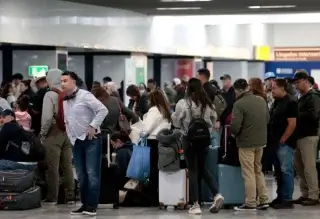read also
 Inflation in Romania Slows to 9.6% but Remains Above Forecast
Inflation in Romania Slows to 9.6% but Remains Above Forecast
 Riots in Mexico Disrupt Air Links to Resort Destinations
Riots in Mexico Disrupt Air Links to Resort Destinations
 UK House Prices Stabilise After 2025 Slowdown
UK House Prices Stabilise After 2025 Slowdown
 Israel Housing Market Eyes a Reset in 2026
Israel Housing Market Eyes a Reset in 2026
 Real Estate Investment Declines in Southeast Europe in 2025
Real Estate Investment Declines in Southeast Europe in 2025
 Asia Becomes the Engine of Global Aviation
Asia Becomes the Engine of Global Aviation
Short-Term Rentals in Spain: 2025 Restrictions and Their Impact

Spain is revising its tourism policy, tightening regulations on short-term rentals following numerous protests. The goal is to curb rising housing prices, return more apartments to the long-term rental market, and protect residents' interests. However, these measures may lead to losses for investors who counted on income from short-term rental properties.
Málaga: Tourist License Freeze
Since January 14, 2025, Málaga has imposed a three-year moratorium on registering new tourist apartments in 43 districts of the city, according to ETIAS.com. These areas already have over 8% of the housing stock used for short-term rental, worsening the affordable housing shortage. The restrictions aim to reduce pressure on the housing market and preserve neighborhoods for permanent residents.
Existing rentals with valid licenses can continue operating. However, properties registered after February 22, 2024, without independent entrances or autonomous utility systems may lose their licenses. As of early 2025, Málaga had 12,653 tourist apartments, offering more than 65,000 beds—a growth that has intensified rental market pressure and sparked protests.
In March 2025, Mayor Francisco de la Torre proposed expanding the moratorium citywide and emphasized the need to revise the PGOU (General Urban Development Plan) to better regulate short-term rentals, as reported by El País.
Other Cities: Bans in Madrid, Alicante, and Seville
In Madrid, short-term rentals are banned in the historic center and in residential buildings where the majority of owners oppose them, notes Idealista. Since November 2024, tourist rentals in buildings without a separate entrance are prohibited. There’s also a cap of one tourist flat per building.
Seville limits the number of tourist properties to 10% of total housing units per district. These measures aim to prevent displacement of residents and ensure housing availability. Authorities are also increasing license compliance inspections.
In Alicante, a two-year freeze on new short-term rental licenses took effect in January 2025, as reported by Skift. Over 3,200 unlicensed properties have been identified, and an audit is underway to determine the maximum number of tourist units allowed by neighborhood.
Barcelona: Full Ban and Tourist Tax Hike
Starting in 2028, Barcelona will ban all short-term housing rentals—becoming the first major city in Spain to take such a step. The city says mass tourist rentals have eroded housing affordability: rents have increased by 68% over the past decade. Over 10,000 properties are currently used for short-term rentals, pushing out long-term residents.
The Supreme Court of Spain upheld the legality of the city’s decision, dismissing appeals by landlords. As a result, licenses will not be renewed beyond 2028. The municipality plans to build more hotels outside the city center and redirect tourist flows.
At the same time, Barcelona is increasing its tourist tax. Starting in 2025, the tax will rise to €15 per night per person, as announced here. The hike will be phased in to allow businesses time to adapt and will apply to hotels and platforms like Airbnb. At least 25% of tax revenue will fund affordable housing initiatives.
A Broader EU Trend
As of July 1, 2025, Spain will launch a mandatory registry for short-term rentals, per Costaluz Lawyers. Owners must obtain a registration number to advertise on platforms. The law is aimed at improving transparency and tax enforcement.
Spain has also launched an investigation into Airbnb. In December 2024, the platform was accused of listing thousands of unlicensed properties. Penalties could reach €100,000 or be tied to profits, writes Reuters. Airbnb responded by asserting its commitment to legal compliance and challenging the accusations.
Spain is not alone. Similar regulations are being discussed in Amsterdam, Venice, and Lisbon. Across Europe, cities are taking action to reduce tourism pressure and preserve housing affordability. These changes may also impact rental policies, visas, and migration laws.
Experts agree: the era of "housing for profit" is waning. A new paradigm—"housing for living"—is emerging. But for investors who banked on short-term rentals, this shift could mean loss of income and declining real estate appeal in Spain and other EU countries.
Подсказки: Spain, Real Estate, Short-Term Rental, Airbnb, Barcelona, Málaga, Investment, Housing Policy, Tourism Regulation, EU Housing


